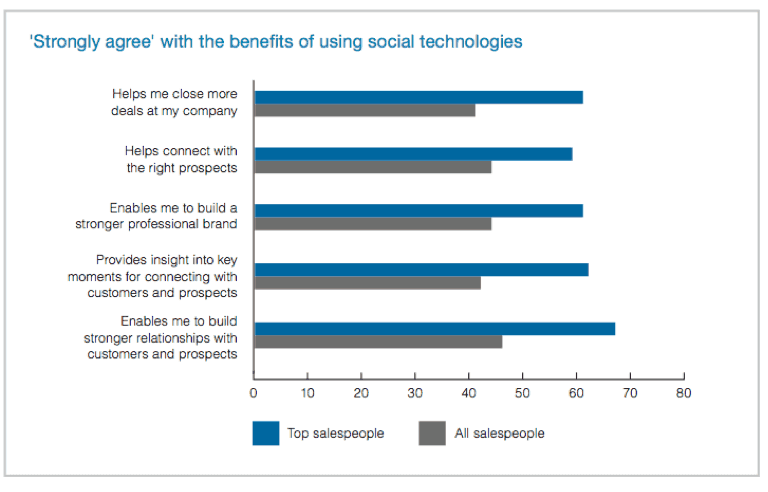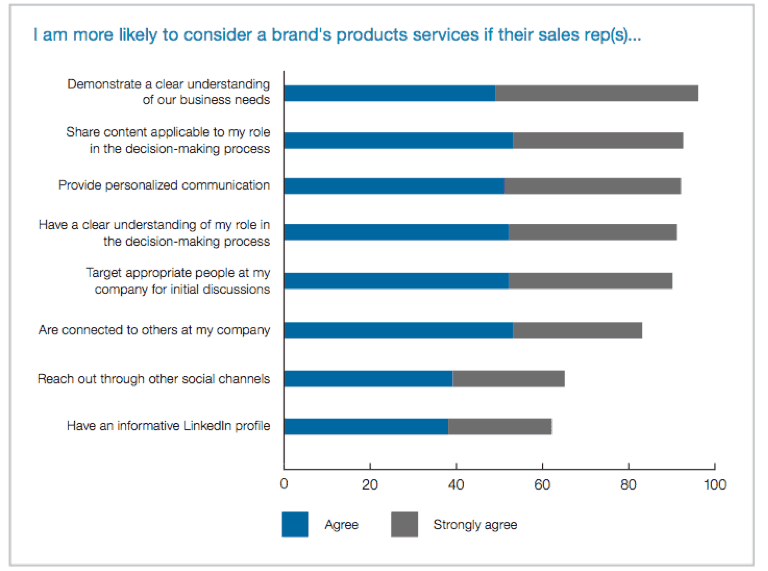The State of Sales 2017 (Report Findings)
LinkedIn recently release a report on The State of Sales 2017 and only affirms what I have been advocating for quite some time already: That, far from being resistant to new methods, more organizations have actually embraced sales technology, allowing it to become deeply embedded in their day-to-day operations.
In this technology-driven world, this finding is hardly surprising. Interestingly, I find myself repeating this at every speaking engagement, and I’ll probably never get tired of saying it: It’s time that we realized just how ingrained digital selling has become in our society.
But what do the numbers from the latest LinkedIn report actually say about the state of digital sales in 2017? And what should your next course of action be if you want to take advantage of this shift in selling and technology?
In this article, I’ll examine the data that The State of Sales 2017 report presents, share my own insights and experiences about each point, and hopefully be of help to you in absorbing what all of this really means for your business.
Digital sales and the tech-driven shift
The LinkedIn report starts with a pretty bold (but unsurprising) claim. Based on their findings, over 91% of sales professionals say that they are using such technologies to shorten lengthy sales cycles, close bigger deals and grow their sales pipeline.
To be honest, this doesn’t really come as a shock to me. What did catch my attention, though, is the 9% that reported that they aren’t using any sort of sales technology at all. That’s almost a tenth of today’s sales professionals that, for one reason or another, have yet to ride the wave of technology that makes their jobs easier.
The role of sales technology in lead generation
This, to me, is further highlighted by the fact that 90% of the sales professionals surveyed affirmed that sales technology was either “important” or “very important” in closing their deals. It’s not too much of a stretch to believe that these are more or less the same people who use sales technology in their day-to-day operations.
Through the use of sales technology such as social networking platforms and customer relationship management (CRM) tools, salespeople are able to get a better picture of who their customers are and what they need. These tools subsequently allow them to apply whatever they learn from the data they’ve gathered about their consumers.
There’s even evidence to support the notion that the data they get is a tremendous help to them. 98% of all top sales professionals confirmed that they do use sales technology to carry out their functions. These salespeople are the same ones who are more open to using a “multi-layered, technology-first” style of working to maximize the benefits of these digital tools for their entire team.
Interestingly, sales professionals in charge of lead generation strategies are the largest segment of tech users — a whopping 60%, compared to inside sales account executives who, collectively, do not use CRM tools or productivity apps as much. If I were in their position, missing out on these great tools (plus the experience of learning how to use them effectively) is something I would actively try to avoid.
Take a closer look at the kinds of technology that the surveyed salespeople said they used:
Social media: Gateway to relationship-building and social selling
From becoming a formerly low-key tactic for marketers, the use of social media for marketing and networking has become a standard practice, or at least one that is adopted by most salespeople these days.
Part of what drives this are expectations that social networks will gain even more prominence in the future. I can personally attest to this as well, plus the fact that traditional strategies such as cold-calling clients simply are not nearly as effective as they used to be.
As the report helpfully explains:
“When today’s buyer wants information about a product or service, they are looking for material that is useful, relevant and, most of all, not overly ‘salesy.'”
Honestly, it all boils down to one thing: Communication. By establishing connections within your social networks, you are able to get to know your potential customers better. You also add a layer of personalization to the entire process, giving your brand a human face. Almost two-thirds of the B2B decision makers who participated in this survey said that any salesperson who did not attempt to reach out to them via personalized communication was unlikely to be entertained.
If you think about it, this makes a lot of sense. How could you trust a business to know what you need if it doesn’t even seem to exert any effort towards understanding the nature of your need? You’re not likely to buy a product or service based on the assumption that it “may or may not” be what you need. No, you don’t have time for that – and you don’t have much room for error in your operations, either.
The sales professionals who participated in the study and apply social technology in their efforts agreed on a number of things, too.
- Using sales technology helped them connect with the right prospects at the right time.
- They were able to build stronger relationships with customers through this technology.
- It also enabled them to build a stronger professional brand.
Linked by LinkedIn
Since we’re talking about professionals in the corporate setting here, it’s not shocking that LinkedIn itself is heavily used by the participants in the study. For B2B decision makers in particular, the majority of them said that they based their decision on whether or not to work with a salesperson on how informative said salesperson’s LinkedIn profile is.
Social media in general was also said to provide valuable insights on relevant information such as job changes and promotions. The respondents also monitored news mentions as an organic way to connect with customers and prospects, an effective trigger event with social selling.
Ultimately, this data suggests that there is definitely a correlation between sales success and including social networks in your sales strategy.
Digital selling: A matter of trust
The rise in prominence of digital sales technology has also served to emphasize one truth: The days of hard selling have gone the way of the dinosaurs.
The role of the salesperson has evolved from persistent peddler to accessible trusted advisor. You no longer chase people around trying to sell your products/services; instead, you show them how you can be of help to them, and grow your relationship from there.
The operative word here, of course, is relationship. As the report shares, good relationships are the cornerstone of a successful sales process. I can’t agree more.
From the very start, I’ve been quite vocal about how important it is to reach out to your customers and get them to understand that they can trust you. And as the study confirms, trust outranks even the aspects of business that you would expect most owners to focus on (such as prices, return on investment, or other economic considerations) as the most significant aspect that determines whether a deal pushes through or not.
But what do sales professionals think? Actually, more of them believe that trust trumps return on investment when it comes to identifying factors that help them close deals.
And as further findings on decision-makers show, the salespeople who said that trust matters most may actually be closer to the truth than they may realize.
Thanks to social platforms, it has become much easier for salespeople to build trust with their prospects. It’s a two-birds-with-one-stone deal; as salespeople gain more knowledge about their target customers, their target customers learn more about them through their public profiles.
Interestingly, this tech-driven digital sales trend has apparently shifted the opinions of decision-makers on salespeople towards a more positive direction. Almost four-fifths of the survey respondents agreed that the sales profession gets a mostly unfair and negative reputation.
In fact, when asked to describe salespeople, the words most of them used were “trustworthy” and “fair” – which is in sharp contrast to the typical portrayal of the profession in various media platforms.
The game of digital sales
One more finding that I find noteworthy, but not really shocking: The younger set of professionals in the workforce are said to be “early adopters” of sales technology in the study. However, of particular interest is the fact that even seasoned professionals are moving towards sales-oriented technology and processes.
It’s true that digital sales technology has redefined the sales game. New developments and methods in digital sales have made sellers more adept at learning about their target audience. This shift has helped more salespeople embrace the reality that it now takes more than just persistence and flowery words to close a deal.
If there’s anything we could all learn from LinkedIn’s findings, it’s that it’s time to start embracing sales technologies if your company hasn’t already… and to invest in skills training for your salespeople to equip them with everything they need to build connections and become even more effective at what they do.
Getting into digital sales is one thing, but learning everything there is to it is an entirely different matter. With the right knowledge and competencies, you can maximize the potential of your digital selling tools for everything from lead generation to relationship-building, all the way to closing that deal.
If need help with digital sales transformation within your organization, don’t hesitate to schedule a call with me. I’d be happy to share my knowledge and experience, and provide assistance in any way I can.
The post The State of Sales 2017 (Report Findings) appeared first on Top Dog Social Media.
Contributer : Top Dog Social Media http://ift.tt/2ypc2Jy
















No comments:
Post a Comment